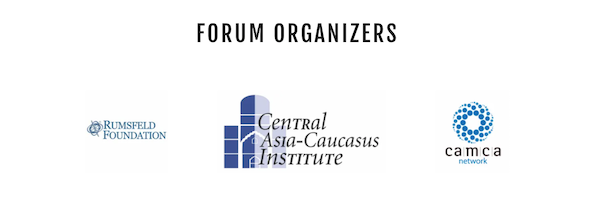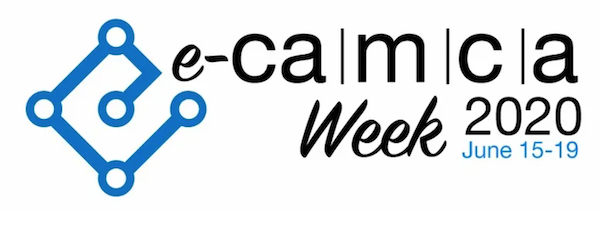CACI Initiative on Religion and the Secular State in Central Asia and the Caucasus
In 2016, the Central Asia-Caucasus Institute & Silk Road Studies Program launched an initiative on documenting the interrelationship of religion and the secular state in the region. This initiative departed from the fact that little systematic reserch had been undertaken on the subject thus far. While there was and remains much commentary and criticism of religious policy in the region, there was no comprehensive analysis available on the interrelationship of religion and the state in any regional state, let alone the region as a whole. The result of this initiative has been the publication of six Silk Road Papers studying the matter in regional states, with more to come. In addition, work is ongoing on a volume putting the regional situation in the context of the Muslim world as a whole.
Case Studies
Each study below can be freely downloaded in PDF format.
Azerbaijan's Formula: Secular Governance and Civil Nationhood
By Svante E. Cornell, Halil Karaveli, and Boris Ajeganov
November 2016
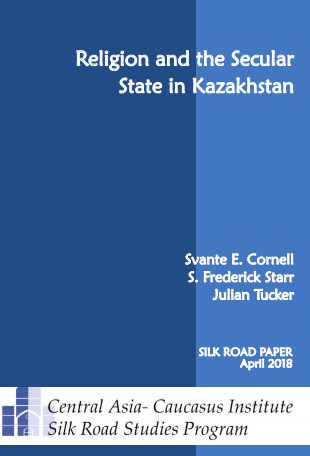 Religion and the Secular State in Kazakhstan
Religion and the Secular State in Kazakhstan
By Svante E. Cornell, S. Frederick Starr and Julian Tucker
April 2018
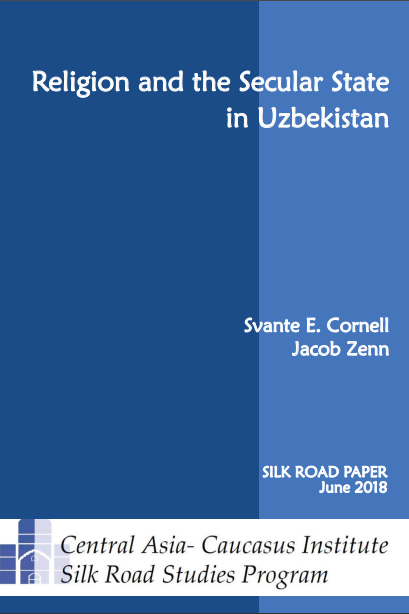 Religion and the Secular State in Uzbekistan
Religion and the Secular State in Uzbekistan
Svante E. Cornell and Jacob Zenn
June 2018
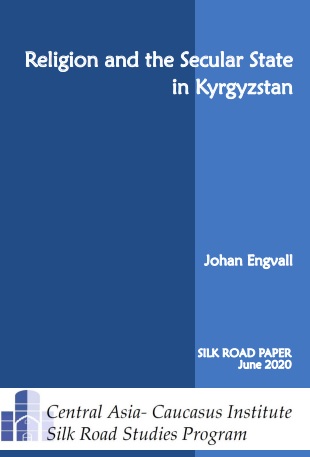 Religion and the Secular State in Kyrgyzstan
Religion and the Secular State in Kyrgyzstan
Johan Engvall
June 2020
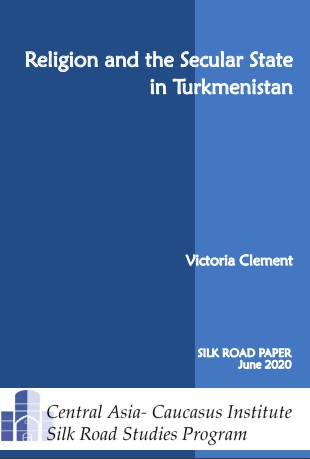 Religion and the Secular State in Turkmenistan
Religion and the Secular State in Turkmenistan
Victoria Clement
June 2020
Articles and Analyses
Svante E. Cornell, "Religion and the State in Central Asia," in Ilan Berman, ed., Wars of Ideas: Theology, Interpretation and Power in the Muslim World, Lanham, MD: Rowman & Littlefield, 2021.
Svante E. Cornell, "Central Asia: Where Did Islamic Radicalization Go?" in Religion, Conflict and Stability in the Former Soviet Union, eds. Katya Migacheva and Bryan Frederick, Arlington, VA: RAND Corporation, 2018.
2021 e-CAMCA REGIONAL FORUM
e-CAMCA 2021 Regional Forum
Meet the talented speakers for each of our Forum panels below!
We are honored to have 30 distinguished panelists and moderators joining us next week from across the CAMCA region and beyond. Our panels are comprised of CEOs, CFOs, Chairmen, Directors, Senior Fellows, Acting Presidents, Deputy Ministers, Director Generals, Founders and more. We look forward to hearing their important insights surrounding this year's theme: "Economic Prospects of the CAMCA Region."
Learn more about the members of the CAMCA Network featured throughout our panels here.
(All times EST)
MONDAY, JUNE 21st
9:45-10:00 AM
“New Opportunities Across CAMCA” - Welcome & Remarks by Dr. Svante Cornell Director, Central Asia-Caucasus Institute, American Foreign Policy Council
10:00-11:00 AM
Panel Discussion - “New Regionalism in Central Asia and Its Challenges”
Moderator:
Dr. S. Frederick Starr, Chairman, Central Asia-Caucasus Institute, AFPC
Speakers:
Dennis de Tray, Board Member and Adviser to the President, Nazarbayev University
Dr. Subir Lall, Deputy Director, Middle East and Central Asia Department, IMF
Dr. Eldor Aripov, Director, Institute for Strategic and Regional Studies under the President of the Republic of Uzbekistan
Dr. Taleh Ziyadov, Director General, Baku International Sea Trade Port, Azerbaijan
Aziza Umarova, Co-Founder, SmartGov Consulting; CAMCA Network Member, Uzbekistan
TUESDAY, JUNE 22nd
9:00-9:45 AM
Keynote Interview with Dr. Sergei Guriev, Professor of Economics & Scientific Director of the Master and PhD programmes in Economics, Sciences Po
Interviewer:
Rakhim Oshakbayev, Director, Center of Applied Research “TALAP”; CAMCA Network Member, Kazakhstan
10:00-11:00 AM
Panel Discussion - “U.S. Withdrawal from Afghanistan: What Does it Mean for Political and Economic Alignments in the Region?”
Moderator:
Michael Doran, Senior Fellow, Hudson Institute
Speakers:
Dr. Omar Sharifi, Country Director, American Institute of Afghanistan Studies; Assistant Professor of Social Sciences, American University of Afghanistan; CAMCA Network Member
Ikram Sehgal, Chairman, Pathfinder Group; Chairman, Karachi Council on Foreign Relations
Amb. Gautam Mukhopadhaya, Senior Visiting Fellow, Centre for Policy Research in New Delhi; former Ambassador of India to Afghanistan (2010-2013)
Alex Vatanka, Director of Iran Program and Senior Fellow, Frontier Europe Initiative, Middle East Institute
Iskander Akylbayev, Executive Director, Kazakhstan Council on International Relations; CAMCA Network Member
WEDNESDAY, JUNE 23rd
9:00-9:45 AM
Keynote Interview with Secretary Carlos Gutierrez, Chairman & CEO, EmPath; Former U.S. Secretary of Commerce
Interviewer:
Samiullah Mahdi, Award-winning journalist and lecturer at Kabul University; CAMCA Network Member, Afghanistan
10:00-11:00 AM
Panel Discussion - “Impediments to Foreign Investments in CAMCA: Real or Imaginary?”
Moderator:
Gaukhar Nurgalieva, Senior Advisor, FMA; CAMCA Network Member, Kazakhstan
Speakers:
Yernar Zharkeshov, Principal and Head of Eurasia, Whiteshield Partners; CAMCA Network Member, Kazakhstan
Yusif Abdullayev, Acting President of Azerbaijan Export and Investment Promotion Foundation (AZPROMO)
Dulguun Baasandavaa, Deputy Chairman, National Development Agency of Mongolia; CAMCA Network Member
Baurzhan Kankin, Chairman, Social Entrepreneurship Corporation “Shymkent”
THURSDAY, JUNE 24th
9:00-9:45 AM
Keynote Interview with Saad Mohseni, Chairman & CEO, MOBY Group, Afghanistan
Interviewer:
Ali Aslan, International TV Presenter & Journalist Zoom
10:00-11:00 AM
Panel Discussion - “Will a New Entrepreneurial Class Drive CAMCA Economies?”
Moderator:
Zabihullah Ziarmal, Director General, Afghanistan National Standard Authority; Chairman, World Trade Centre Kabul Afghanistan; CAMCA Network Member
Speakers:
Valeri Chekheria, Serial entrepreneur and hotelier; Founder and CEO of Hospitality Projects; Adviser to the Minister of Economy and Sustainable Development of Georgia
Abdullo Kurbanov, Co-founder and CEO, Alif Bank; CAMCA Network Member, Tajikistan
Khulan Davaadorj, Founder, Director and Chief Technologist, LHAMOUR LLC; CAMCA Network Member, Mongolia
Aziz Soltobaev, Founder, KG Labs Public Foundation; CAMCA Network Member, Kyrgyzstan
Abdulahad Badghisi, General Manager, Samarkand Bukhara Silk Carpet JV
FRIDAY, JUNE 25th
9:00-9:45 AM
Keynote Interview with Douglas Becker, Founder & Chairman, CINTANA Education; Board Chair, International Youth Foundation
Interviewer:
Dr. Mamuka Tsereteli, Senior Fellow, Central Asia-Caucasus Institute, AFPC
10:00-11:00 AM
Panel Discussion - “Can Education Systems of CAMCA Countries Adjust to New Labor Market Demands?”
Moderator:
Yernar Zharkeshov, Principal and Head of Eurasia, Whiteshield Partners; CAMCA Network Member, Kazakhstan
Speakers:
Dr. Shamsh Kassim-Lakha, Chairman of the Board of Trustees, University of Central Asia
Fariz Ismailzade, Executive Vice Rector, ADA University, Azerbaijan
Hikmat Abdurahmanov, Co-founder and CEO, TEAM University; Co-founder, HMPARTNERS; CAMCA Network Member, Uzbekistan
Talant Sultanov, Co-founder and Chair, Kyrgyz Chapter of the Internet Society; CAMCA Network Member, Kyrgyzstan
Dr. Irakli Laitadze, Chief Financial Officer, GMT Mtatsminda; Lecturer at Ilya State University in Tbilisi; CAMCA Network Member, Georgia
[VIDEO POSTED] CAMCA Forum Event: Uzbekistan's Emerging Private Business Development
Uzbekistan's Emerging Private Business Development
Co-organized by the Central Asia-Caucasus Institute, the CAMCA Network and Rumsfeld Foundation
This forum examined the rising private sector in Uzbekistan, as experienced by some of the impressive young entrepreneurs who are making it happen.
Speakers:
Zafar Khashimov, Entrepreneur and Founder of the Supermarket Chain Korzinka.uz
Hikmat Abdurahmanov, Entrepreneur, Co-founder of HM Partners/TEAM University, CAMCA Network Member
Dora Atadjanova, Founder and CEO of “Teodora Goods”, exporter of agricultural goods, and “Dalatek”, agro-tech platform and mobile application
Anvar Irchaev, Director, Orient Capital Management
Zuhursho Rahmatulloev, Co-Founder, Alif Bank in Tajikistan and CEO, Alif Tech in Uzbekistan, CAMCA Network Member
Moderator:
S. Frederick Starr, Chairman, Central Asia-Caucasus Institute at American Foreign Policy Council
When: Wednesday, May 12, 2021
The event was also live-streamed on the CACI YouTube page.
[Video Posted] CACI Online Forum: Status Update on Uzbek Reforms
Status Update on Uzbek Reforms
Speakers:
Ron van Rooden, Chief of
Aziza Umarova, CEO, SmartGov
Alexander Gordin, Managing Director, Broad Street Capital Group
Moderator:
Mamuka Tsereteli, Senior Fellow, Central Asia-Caucasus Institute
When: Tuesday, September 29, 2020 at 10am EDT
The event was live-streamed on our Facebook page and is now available on Youtube.
CACI and the Rumsfeld Foundation hosted e-CAMCA Week 2020
In lieu of our in-person annual gathering, the CAMCA Regional Forum organizers are hosting a virtual e-CAMCA Week.
The June 2020 CAMCA Forum, to be held in Almaty, Kazakhstan, was postponed until June 2021. In its place, CACI and the Rumsfeld Foundation organized the e-CAMCA week of online events and publication. Find recordings of the e-CAMCA Week virtual events held over June 15th-19th at the CAMCA Forum YouTube Channel, as well a variety of original #CAMCAweek publications and resources for our CAMCA Forum community at www.camcaforum.org,.


E-CAMCA WEEK PUBLICATIONS
Welcome Letter
Letter from Secretary Donald Rumsfeld
e-CAMCA Week 2020 participants
Meet CAMCA Entrepreneurs
View features of some successful regional entrepreneurs from our CAMCA Network
"Caucasus & Central Asia Post COVID-19" Series- Volume I
Digital Transformation in the CAMCA Region
Post COVID-19: Challeges & Opportunities for the Region
